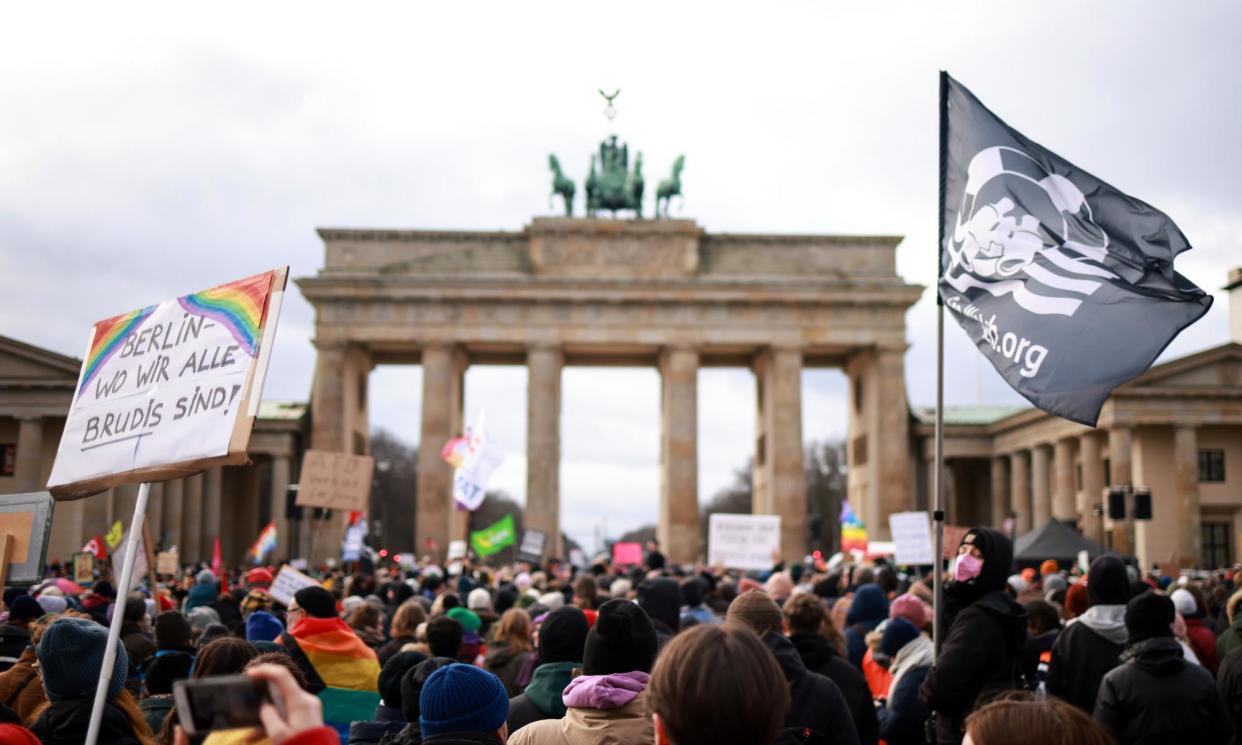Germans take to streets after AfD meeting on mass deportation plan

Thousands of people across Germany have taken to the streets for a fourth consecutive day to voice their opposition to the far-right populist AfD party after politicians from the party met neo-Nazis to discuss a “master plan” for the mass deportation of asylum seekers and German citizens of foreign origin.
Protests have taken place in Leipzig, Rostock, Essen and Berlin in recent days.
The AfD’s leadership has sought to distant itself from the gathering in November on the outskirts of Potsdam, west of Berlin, which was revealed by the investigative journalism network Correctiv on Wednesday. However, several party members were involved and have since voiced their support for the ideas discussed.
Related: ‘The mood is heating up’: Germany fears strikes will play into hands of far right
On Monday, Alice Weidel, the co-chair of the party, announced she was parting ways with her adviser Roland Hartwig, after his participation in the event was confirmed. Weidel said she had had no knowledge of his involvement and said the AfD did not support the deportation plan.
Party members said Hartwig, a former manager of the chemicals firm Bayer who spent four years sitting as an AfD MP, was an important and respected member of the AfD and would continue to play an important role behind the scenes, prompting accusations that Weidel’s decision had been a tactical move to appear to distance herself and the party from the event.
Among MPs to publicly express their support for the ideas discussed at the meeting was René Springer, a representative for the state of Brandenburg in the federal government. On X, he stated that far from being a secret, the plan was a promise the AfD would fulfil should it get into power. “We will send foreigners back to their homelands. Millions of them. That is not a #secret plan. That is a promise,” he wrote.
German media have not held back in drawing parallels between the Potsdam meeting and the notorious Wannsee conference of 1942, when high-ranking Nazis and government figures gathered at a lakeside villa to discuss how to coordinate the implementation of the Nazi plan for the mass extermination of Europe’s Jews.
Wolfgang Thierse, a former president of the German parliament who is considered a moral authority in the country, threw his weight behind an initiative to explore the possibility of banning the party on the grounds of anti-constitutionality.
He also offered his support for a petition looking to revoke the basic rights of prominent party members considered to be enemies of the constitution. A petition specifically directed against the Thuringia AfD’s group leader, Björn Höcke, has gained traction since the Potsdam meeting was revealed and by Tuesday had garnered more than 830,000 signatures.
Representatives of the judiciary issued a joint statement on Monday, condemning the meeting.
“What was conjured up in a small circle in Potsdam in November is more than just a horrifying vision. More specifically it is an attack on the constitution and the liberal constitutional state,” the German Association of Judges, the German Lawyers’ Association and four affiliating organisations said.
Thierse told the broadcaster DLF that “shoulder shrugging” was an inadequate reaction to the rise of the 11-year-old AfD, which has been surging in the polls in recent months.
“Our democracy is in a critical state,” he said. “Some of this reminds us of events 90 years ago. In 1930, the Nazi party stood at 14.15%, and three years later it was in power and had done away with democracy.”
The European parliament is due to debate the resurgence of neo-fascism across the continent on Tuesday evening, after a last-minute agenda item was added to address a chilling video from Italy that appeared to show hundreds of men making fascist salutes earlier this month.
The debate was put on the agenda by the The Progressive Alliance of Socialists and Democrats (S&D). Its members were “outraged and distressed” by the images, the S&D leader, Iratxe García, said in a statement.
“The rise of neo-fascism is a dark cloud that looms across parts of Europe,” García said. “It is both unacceptable and alarming that in 2024 we still bear witness to such scenes.”
García also took aim at Italy’s prime minister, Giorgia Meloni, for her reaction to the issue. “What is even more disconcerting is the lack of consequences and the lack of a clear, decisive response from the prime minister,” she said. “Why has Meloni chosen silence? Why has she not condemned these disturbing images?”
The parliament’s Renew Europe group called on Meloni to condemn the acts depicted in the video.
“While the shocking ceremony in Italy has been witnessed before, it is indicative of a worrying rise in far-right groups across Europe,” it said in a statement.


